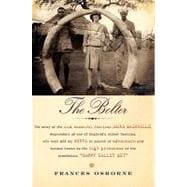
Note: Supplemental materials are not guaranteed with Rental or Used book purchases.
Purchase Benefits
What is included with this book?
Frances Osborne was born in London and studied philosophy and modern languages at Oxford University. She is the author of Lilla’s Feast. Her articles have appeared in the Daily Telegraph, The Times, The Independent, The Daily Mail, and Vogue. She lives in London with her husband, a Member of Parliament, and their two children.
The New copy of this book will include any supplemental materials advertised. Please check the title of the book to determine if it should include any access cards, study guides, lab manuals, CDs, etc.
The Used, Rental and eBook copies of this book are not guaranteed to include any supplemental materials. Typically, only the book itself is included. This is true even if the title states it includes any access cards, study guides, lab manuals, CDs, etc.
Excerpted from The Bolter by Frances Osborne
All rights reserved by the original copyright owners. Excerpts are provided for display purposes only and may not be reproduced, reprinted or distributed without the written permission of the publisher.